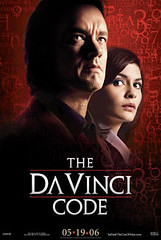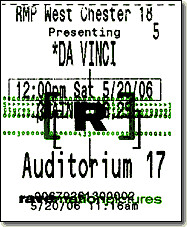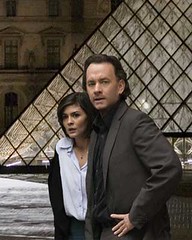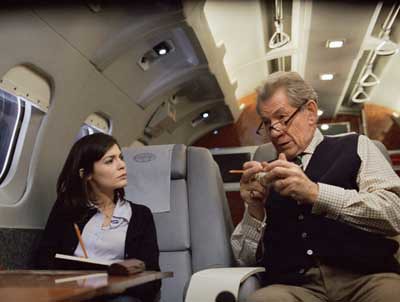The Da Vinci Code from my perspective
Posted By RichC on May 21, 2006
 I suspect there is too much be written about Dan Brown’s book, The Da Vinci Code (published in 2003), and the ‘just released’ movie. Maybe though, there are many are like me who are just curious enough to want to discuss the book and movie from the social cultural perspective after having read the book and seen the movie? If you are tired of the overwhelming number of reviews, opinions, the ‘what you should think’ controversy and the dollars ‘we’ pour into fictional stories and Hollywood movies … then just pass on reading this post. For those wanting a little more, I’ll try to keep ‘my thoughts’ concise.
I suspect there is too much be written about Dan Brown’s book, The Da Vinci Code (published in 2003), and the ‘just released’ movie. Maybe though, there are many are like me who are just curious enough to want to discuss the book and movie from the social cultural perspective after having read the book and seen the movie? If you are tired of the overwhelming number of reviews, opinions, the ‘what you should think’ controversy and the dollars ‘we’ pour into fictional stories and Hollywood movies … then just pass on reading this post. For those wanting a little more, I’ll try to keep ‘my thoughts’ concise.
 My wife and I both read the ‘work of fiction,’ The Da Vinci Code,’ by the best selling author Dan Brown a couple of years ago. We enjoyed the book and discussed it quite a bit when it was first published. We both found it an intriguing story that blended tidbits of factual history with a creative story of secrecy and cover up into an interesting plot. I’ve always enjoyed books of ‘factual fiction’ and have read most of the novels by Tom Clancy, Stephen Coonts, Clive Cussler among others. (guy books) In keeping with the ‘factual fiction’ writing style, Dan Brown uniquely merges fact and weakly or unsupported conclusions into the entertaining storyline of the Da Vinci Code. After having a couple good debates with family members and listening to a perspective or two from scholars and pastors, we decided to see the movie for ourselves.
My wife and I both read the ‘work of fiction,’ The Da Vinci Code,’ by the best selling author Dan Brown a couple of years ago. We enjoyed the book and discussed it quite a bit when it was first published. We both found it an intriguing story that blended tidbits of factual history with a creative story of secrecy and cover up into an interesting plot. I’ve always enjoyed books of ‘factual fiction’ and have read most of the novels by Tom Clancy, Stephen Coonts, Clive Cussler among others. (guy books) In keeping with the ‘factual fiction’ writing style, Dan Brown uniquely merges fact and weakly or unsupported conclusions into the entertaining storyline of the Da Vinci Code. After having a couple good debates with family members and listening to a perspective or two from scholars and pastors, we decided to see the movie for ourselves.
I don’t intend to tell the story or grind the details since it is better done by professional book and movie reviewers or the many scholars of church history attempting to differentiate the ‘work of fiction’ account from ‘real history.’ What I will conclude is that both the book and movie are well done from the standpoint of entertainment. My fear is that there is a generation of young people learning history through movies without the ability to separate real events in history from the movie-maker’s perspective. This is particularly disturbing when the movies are “fictional accounts of true events.”
 As movies based on books go, Ron Howard did an outstanding job of presenting the story told in Dan Brown’s novel — in the least offensive way as possible. What I’m referring to is the blasphemous way the novel deals with Christianity. Unless you’ve been living under a rock, you’ve no doubt heard about the offensive claims posed by Dan Brown against Biblical accounts. Brown’s single line preceding the novel claims “All descriptions of artwork, architecture, documents, and secret rituals in this novel are accurate.” Maybe that statement leaves wiggle room from the author’s perspective as to what is surmised and what is fact … but may Christ followers find the conclusion and position that the book is based on ‘fact’ offensive.
As movies based on books go, Ron Howard did an outstanding job of presenting the story told in Dan Brown’s novel — in the least offensive way as possible. What I’m referring to is the blasphemous way the novel deals with Christianity. Unless you’ve been living under a rock, you’ve no doubt heard about the offensive claims posed by Dan Brown against Biblical accounts. Brown’s single line preceding the novel claims “All descriptions of artwork, architecture, documents, and secret rituals in this novel are accurate.” Maybe that statement leaves wiggle room from the author’s perspective as to what is surmised and what is fact … but may Christ followers find the conclusion and position that the book is based on ‘fact’ offensive.

Howard (and perhaps Hanks) chose to soften the character of Robert Langdon and made him a bit more sensitive to Christian history. He modifies Brown’s more secular Langdon and gives the character a few lines that refute some of the conclusions the “Grail Seeker,” Lee Teabing, proposes. Facial expression from Tom Hanks from my perspective also offered addition doubt to Teabing’s blasphemous statements when talking to Sophie. In a small way Ron Howard ‘softens’ the film version of the novel in its portrayal of Christian history.
 Brown used his two primary characters, the American Harvard professor Robert Langdon (played by Tom Hanks) and Sophie Neveu (played by Audrey Tautou) to unroll his story that Jesus and Mary Magdalene were married and bore a child AND that the Holy Grail was not a chalice as history knows it, but the offspring of Christ … the “royal bloodline.” The novel weaves in symbols and history in a 2000 year cover up of this through secret societies that continue to this day. As a ‘fictional story’ it is intriguing, as a Christian it is also blasphemous, especially if it is being sold as “accurate” from the standpoint of history. Imagine any other religion, nationality or race being written about in this way? If their history was questioned, comments critical to the core divinity of their belief written and filmed or events questioned as true or accurate … what would the press and public say? I surmise that if this were an anti-Jewish, Islam, African American or critical of homosexuals that the book and movie would be talked about and covered differently. I know from an incident just a few months ago what would happen in the religion of Islam. In other words, there is a reason why this ‘fictional story’ is a sensitive issue to most devoted Christians and why some are angry about its popularity and positive treatment. One off our pastors (Dan Dunlop) made the comment when he watched the movie with one of his Catholic neighbors that he felt as “if his best friend was being assaulted.” There is an interesting unity happening between different ‘faiths’ of Christianity.
Brown used his two primary characters, the American Harvard professor Robert Langdon (played by Tom Hanks) and Sophie Neveu (played by Audrey Tautou) to unroll his story that Jesus and Mary Magdalene were married and bore a child AND that the Holy Grail was not a chalice as history knows it, but the offspring of Christ … the “royal bloodline.” The novel weaves in symbols and history in a 2000 year cover up of this through secret societies that continue to this day. As a ‘fictional story’ it is intriguing, as a Christian it is also blasphemous, especially if it is being sold as “accurate” from the standpoint of history. Imagine any other religion, nationality or race being written about in this way? If their history was questioned, comments critical to the core divinity of their belief written and filmed or events questioned as true or accurate … what would the press and public say? I surmise that if this were an anti-Jewish, Islam, African American or critical of homosexuals that the book and movie would be talked about and covered differently. I know from an incident just a few months ago what would happen in the religion of Islam. In other words, there is a reason why this ‘fictional story’ is a sensitive issue to most devoted Christians and why some are angry about its popularity and positive treatment. One off our pastors (Dan Dunlop) made the comment when he watched the movie with one of his Catholic neighbors that he felt as “if his best friend was being assaulted.” There is an interesting unity happening between different ‘faiths’ of Christianity.
As a Christian, I’m forcing myself to look at this movie from a positive perspective … what God would want me to do with all the attention being placed on Christ? Just as Mel Gibson’s “The Passion of the Christ” stimulated many to delve in The Word, I believe “The Da Vinci Code” will do the same. It will no doubt shake the faith of many struggling Christians, but will strengthen those seeking the true and open opportunities of evangelism where doors have been close. Perhaps the book and the movie will make stronger Christians of those of us wanting to share the Good News Jesus offers?
Comments